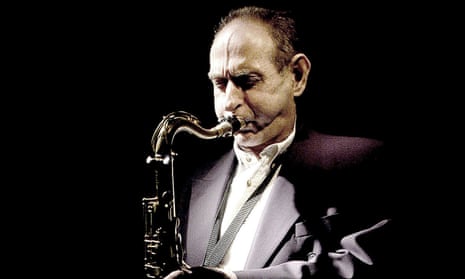Bobby Wellins, the Scottish jazz saxophonist whose fragile, quivering tone seemed to echo the sounds of his homeland’s pipers and folk singers as well as the American jazz heroes of his childhood, has died aged 80. Wellins was most famous for a single, exquisite improvised solo on Starless and Bible Black, from the pianist Stan Tracey’s 1965 classic Under Milk Wood – a tenor saxophone passage of birdlike warbles, mournful hoots softly blown into deep spaces, fragmentary motifs that would briefly consolidate into hints of a songlike theme.
But almost any Wellins performance across what were effectively two remarkable playing lives – either side of a 10-year layoff from the mid-60s which he spent overcoming addictions and depression – would have moments of comparable magic. Like the performance I witnessed at the Vortex club in London in 2001, a part of Tracey’s extended 75th birthday celebrations. Wellins joined his old sparring partner on a gig that confirmed the bebop pioneer Max Roach’s adage – that jazz always allows you to be who and what you are, at whatever stage of life you happen to have reached.
Wellins issued a characteristic stream of fitful trills, sudden clipped-note outbursts, startled yelps and spiralling wriggles into the upper register on Thelonious Monk’s In Walked Bud, while Tracey’s chords stamped and snorted in the frequent spaces he left – and My Way, stripped of its grandiosity, was recast as a kind of limping cha-cha. It was music of magnificent eccentricity, with Wellins managing to be both Tracey’s alter ego and his polar opposite, in the wistful resignation with which he would greet his partner’s peremptorily barging methods.
Wellins was born in Glasgow. Both his father, Max Wellins, a saxophonist, and his mother, Sally Coull, a singer, were performers with the Sammy Miller Show Band, and his father was Bobby’s first saxophone teacher, introducing him to the alto at the age of 12, and then to jazz harmony on the piano. Moving south to West Sussex, Wellins studied harmony at Chichester College of Further Education, and clarinet at the RAF School of Music in Uxbridge, west London.
In 1956-57, he worked with Buddy Featherstonhaugh’s swing band, in a lineup that included the newly arrived young Canadian expat trumpeter Kenny Wheeler. The following year, Wellins worked on US-bound ocean liners, and between 1959 and 1961 worked with two influential British drummer-leaders, Tony Crombie and Tony Kinsey, and on the saxophonist Tommy Whittle’s residency at the Dorchester hotel in London.
Ronnie Scott’s first club, founded in Gerrard Street, central London, in 1959, had begun to attract illustrious American guests by the early 60s, and the West End’s jazz scene was briefly booming. Duncan Lamont’s Nucleus club became what Wellins called his “jazz university”, an after-hours jamming haunt he would visit in the small hours after Whittle’s Dorchester gig. Wellins joined Crombie’s compositionally classy Jazz Incorporated band on its gigs at the Flamingo club, and through it met Tracey - in those days the regular pianist for both Crombie and the Scott club.
The pair quickly realised how much they had in common, eloquently realised in 1961 on Wellins’s haunting suite Culloden Moor and four years later on Tracey’s personal tribute to Dylan Thomas’s radio play Under Milk Wood. Tracey and Wellins were bonded in life by downbeat humour, in music by a relish for the balancing-point between lyrical warmth and Monk’s enigmatic terseness – and eventually also by the attractions of the jazz world’s easy access to narcotics. Heroin almost destroyed the careers of both of them, but with the support of family and fellow musicians, they came through it to produce enduring work for the next three decades.
Wellins left London to live in Bognor Regis, West Sussex, with his family, and after a painful personal battle (triggered, as he told me in 2006 in an interview for JazzUK magazine, by his wife Isobel’s observation that “I was seeming like a monster to my own children”), he returned to playing and recording – notably with the albums Jubilation (1978) and Dreams Are Free (1979), and often in the company of the pianist Pete Jacobsen.
He began teaching at the West Sussex Institute of Higher Education in Chichester, toured in 1980 with the trombonist Jimmy Knepper, was a soloist in Charlie Watts’s eclectic improv-to-swing orchestra (1985-86), and worked in the 1990s in big bands led by the clarinettist and soprano saxist Bob Wilber, and with John Barnes and Spike Robinson in Tenor Madness (1996). In the 90s he also made the superb standard-songs album Don’t Worry ’Bout Me, and a memorable Billie Holiday tribute, The Satin Album, and resumed working with Tracey in 1997.
Wellins also forged fruitful partnerships with the pianists Mark Edwards and Kirk Lightsey, forming a regular trio with the former alongside the bassist Andy Cleyndert and drummer Spike Wells that spurred some of the most poised and imaginative playing of his career. Always believing that his best was still to come, in his 70s Wellins continued to play beautifully in new partnerships, such as his duo with the pianist-composer Kate Williams on Smoke and Mirrors (2012) and in 2014 as principal soloist with the Scottish National Jazz Orchestra on a dramatic, mournful and moving revisit to the Culloden Moor suite. In 2013, Wellins was the subject of the documentary film Dreams Are Free, directed by Gary Barber, and shown at the Brighton, Chichester and London film festivals that year.
Wellins is survived by Isobel and their daughters, Fiona and Liz.

Comments (…)
Sign in or create your Guardian account to join the discussion